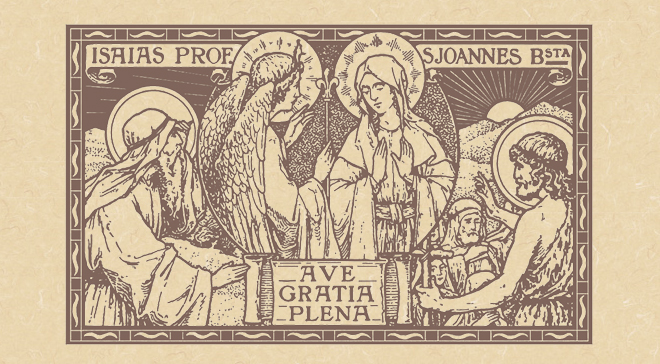

| The Grace of the Holy Spirit Knoweth No Slow Working. [Selections from Matins.] Ember Friday of Advent.* FatherVenditti.com |
Lesson i When any one asketh another for credence, he is bound to give some reasonable ground. And so the Angel, when he announced to Mary the counsel of God, gave, as a proof, the conception of Elizabeth, then aged and barren, that Mary might perceive, by this example, that with God nothing is impossible. When the holy Virgin had heard it, she arose and went to visit her cousin. She did not go to see if what she had heard was true, because she did not believe God, or because she knew not who the messenger had been, or yet because she doubted the fact adduced in proof. She went joyfully as one who hath received a mercy in answer to his vow goeth to pay the same. She went with devotion, as a godly person goeth to execute a religious duty. She went into the hill country in joyful haste. And is it not something that she went up into the hills? God was already in her womb, and her feeling bore her continually upward. The grace of the Holy Spirit knoweth no slow working. Lesson ii Godly women will learn from the example of the Mother of God to take a tender care of their kinswomen who are with child. In pursuance of this charity, Mary, who had hitherto remained alone at home, was not deterred by her maidenly shyness from entering on a public journey; she faced for this end the hardships of mountain travelling; and encountered with a sense of duty the weary length of the way. The Virgin left her home, and went into the hill country with haste, unmindful of the trouble, and remembering only the office to which her cousinly love prompted her, in spite of the delicacy of her sex. Maidens will learn from her not to idle about from house to house, to loiter in the streets, nor to take part in conversations in public. Mary, as she was hasteful to pass through the public roads, so was she slow again to enter on them she abode with her cousin about three months. Lesson iii As the modesty of Mary is a pattern for the imitation of all maidens, so also is her humility. She went to see Elizabeth, like one cousin going to visit another, and as the younger to the elder. Not only did she first go, but she first saluted Elizabeth. Now, the purer a virgin is, the humbler ought she to be. She will know how to submit herself to her elders. She that professeth chastity ought to be a very mistress of humility. Lowly-mindedness is at once the very ground in which devotion groweth, and the first and principal rule of its teaching. In this act of the Virgin, then, we see the greater going to visit and to succour the lesser: Mary to Elizabeth, Christ to John.
|